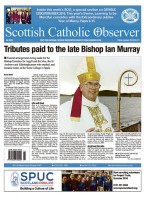January 22 | ![]() 0 COMMENTS
0 COMMENTS ![]() print
print

Life is precious, hope essential and mercy required
This week’s editorial leader
If nothing else remains at the end or changes as a result of the Extraordinary Jubilee Year of Mercy than what was achieved at the weekend then it is already a success. Do not dismiss Pope Francis’ surprise ‘Mercy Visit’ to the sick and elderly as a mere photo opportunity. He is leading, by example, the way to become closer to Christ.
The Vatican said Pope Francis wanted to highlight—in a global ‘throwaway culture’—the great importance and preciousness of the elderly and grandparents as well as the value and dignity of life in every situation.
The second Mercy event that had real resonance is Pope Francis’ message to young people in which he urges them not to be despondent, not to lose Faith, hope or their dreams. This theme in the Year of Mercy will likely be further explored during the youth pilgrimage to Rome in April and at World Youth Day in Krakow in July.
While the Pope’s first visit to a Rome Synagogue may not have been strictly a Mercy event it did result in an unequivocal condemnation of violence in God’s name—a message for today and always, for the Middle East and the rest of the world alike.
“The violence of man against man is in contradiction with any religion worthy of this name, in particular the three great monotheistic religions—Judaism, Christianity and Islam,” he said. “Conflicts, wars, violence and injustices open deep wounds in humanity that call on us to strengthen our commitment to peace and justice. Neither violence nor death will ever have the last word before God.”
The joy of seeing Christian denominations come together for the St Mungo Festival in Glasgow, ahead of the week of Christian Unity this week, was something to behold.
Glasgow pupils clearly enjoyed taking part in events such as Mungo Bairns and the Feast Day Mass at St Mungo’s, Townhead, helped by teachers in training. Seeing members of civic society such as Bailie Josephine Docherty, representing the Provost, and Councillor Gordon Matheson at the annual Molendinar Lecture was also encouraging.
In spite of the minority humanist and secular forces in our society that would see our Church, and others, run out of the public square, in Glasgow it is clear that faith and public service share cooperation and mutual respect, regardless of denomination or party label. It is that kind of respect that will win hearts and minds at the May Scottish Parliamentary Elections.











